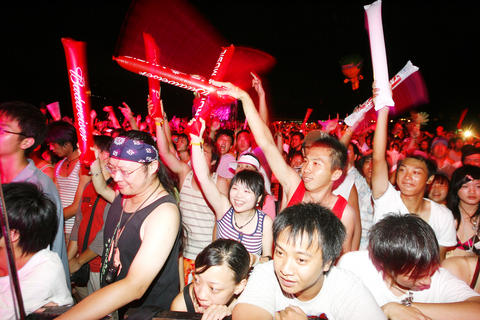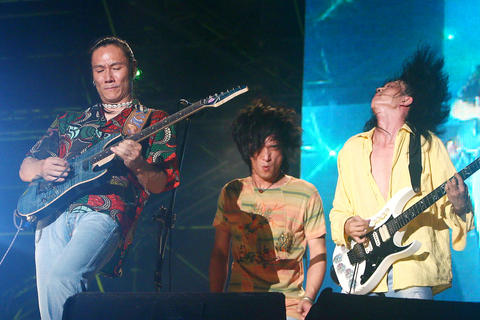When Cui Jian (崔建) steps onto the stage this weekend at the Ho-Hai-Yan rock festival, many of the tens of thousands of people in the audience at Fulong (福隆) beach will be too young to fully appreciate what they are seeing. More than just China's biggest rock star, his country's Bob Dylan, John Lennon and Bruce Springsteen, the raspy-voiced master of coded lyrics is a symbol of the 1989 student-led Tiananmen Square democracy movement. Before the People's Liberation Army shot its way through Beijing on June 4, Cui was seen milling with the students and his song Nothing To My Name (一無所有) was their unofficial anthem. A year later, Cui's New Long March tour was cancelled by the government after he appeared on stage wearing a red blindfold before performing one of his political anthems. He would not play a large-venue show in Beijing again until 2004.
Taiwan Colors Music (TCM, 角頭音樂), the indie record label that started Ho-Hai-Yan (海洋音樂祭), has been trying to bring Cui to Taiwan for years. First China would not let him go. Last year TCM lost its role in the festival when the Taipei County government chose Formosa Television (FTV, 民視) to run the event. TCM announced it had booked Cui along with several other international bands and would stage its own, alternative "People's Hohaiyan Rock Festival" but ultimately failed to do so. Now TCM is back as the planner of this year's fest, and if everything goes according to plan, Cui's first Taiwan performance will start Sunday at 9pm. "He's finally going to make it," said TCM head Zhang 43 (張43) who calls Cui "the most important rock star in Asia."
Eight years after it started as a tiny gathering of indie musicians, Ho-Hai-Yan has ballooned into a major three-day festival with international acts paid for by NT$20 million from the Taipei County Government and an undisclosed amount from big corporate sponsors like 7-Eleven, MTV and Chunghwa Telecom. This year organizers are predicting 300,000 people will attend.

Like Spring Scream, Ho-Hai-Yan has become a rite of passage for would-be rock stars, with a battle of the bands that culminates in the Taiwan Indie Music Awards. As always, the 10 bands competing this year made it to the finals by passing a first cut with a demo and a second cut at regional concerts. The winner gets NT$200,000, a huge boost for amateur musicians without major label backing. Sodagreen, the folk rock band that won in 2004, took home the highly coveted Best Band trophy at last month's Golden Melody Awards.
This year's battle of the bands starts at 3pm today. Two of the favorites to win - happy punks Children Sucker (表兒) and Dingding and Ding Ding and Xi Xi (丁丁與西西), a brand new act - perform at 4pm and 4:30pm. Last year's winners Punk Hoo take the stage at 7pm. Following their set the winner of this year's contest will be announced.
The other main attractions this weekend, both of whom play tomorrow, are San Francisco-based Xiu Xiu - an experimental pop band whose influences include 1980s British goth punk, the Cure, Joy Division, "really harsh noise," electronica and New Music composers like Dmitri Shostakovich - and Japan's Boom Boom Satellites, a digital hard-core band who have performed at Ho-Hai-Yan before and were the main act on the second day of this year's Fuji Rock Festival.

PHOTOS: TAIPEI TIMES FILE
Interviewed by phone yesterday from his Taipei hotel room, Xiu Xiu founder and singer-songwriter Jamie Stewart said his band brought its drum machines, handmade guitar pedals, other "electronic sorts of things," a harmonium and a flute. He's played in Japan and has heard of Boom Boom Satellites and Cui Jian, but isn't familiar with any of the other bands. "It's sort of a cliched thing to say, but any opportunity to be out of town is great, particularly when it's some place extraordinarily far away," he said. "This whole trip is really kind of unbelievable."
Arthur Chen (陳彥豪), Ho-Hai-Yan's international band coordinator, happened upon Xiu Xiu while he was in New York filming Taiwanese baseball star Wang Chien-ming (王建民). Chen, who often DJs at Taipei's Underworld pub, said he scoured New York for bands and wanted to spend the government's money on one that lacked media exposure.
It's hard to overestimate the historical significance of Cui Jian's first visit to Taiwan, not to mention the gravitas he lends to Sunday's otherwise pedestrian lineup. With apologies to groups like Tang Dynasty (唐朝樂隊), Cui is the only Chinese rocker with real international status. And he seems to be taking his Taiwan visit very seriously. Chen said the 45-year-old rock star started practicing his set a month ago and will be bringing an entourage of 17 people, including eight band members and his 76-year-old mother.
Cui's warm-up acts on Sunday are Singaporean pop star Tanya Chua (蔡健雅), a popular singer of romantic ballads in the 1990s, followed by the frequently paired combination of Chang Chen-yue (張震嶽), who has long skated a fine line between Mando-pop and hard rock, and rapper MC Hot Dog, who does the same thing with Mando-pop and rap.
Then history will be made.
On the Net: www.hohaiyan.com

Google unveiled an artificial intelligence tool Wednesday that its scientists said would help unravel the mysteries of the human genome — and could one day lead to new treatments for diseases. The deep learning model AlphaGenome was hailed by outside researchers as a “breakthrough” that would let scientists study and even simulate the roots of difficult-to-treat genetic diseases. While the first complete map of the human genome in 2003 “gave us the book of life, reading it remained a challenge,” Pushmeet Kohli, vice president of research at Google DeepMind, told journalists. “We have the text,” he said, which is a sequence of

On a harsh winter afternoon last month, 2,000 protesters marched and chanted slogans such as “CCP out” and “Korea for Koreans” in Seoul’s popular Gangnam District. Participants — mostly students — wore caps printed with the Chinese characters for “exterminate communism” (滅共) and held banners reading “Heaven will destroy the Chinese Communist Party” (天滅中共). During the march, Park Jun-young, the leader of the protest organizer “Free University,” a conservative youth movement, who was on a hunger strike, collapsed after delivering a speech in sub-zero temperatures and was later hospitalized. Several protesters shaved their heads at the end of the demonstration. A

Every now and then, even hardcore hikers like to sleep in, leave the heavy gear at home and just enjoy a relaxed half-day stroll in the mountains: no cold, no steep uphills, no pressure to walk a certain distance in a day. In the winter, the mild climate and lower elevations of the forests in Taiwan’s far south offer a number of easy escapes like this. A prime example is the river above Mudan Reservoir (牡丹水庫): with shallow water, gentle current, abundant wildlife and a complete lack of tourists, this walk is accessible to nearly everyone but still feels quite remote.

In August of 1949 American journalist Darrell Berrigan toured occupied Formosa and on Aug. 13 published “Should We Grab Formosa?” in the Saturday Evening Post. Berrigan, cataloguing the numerous horrors of corruption and looting the occupying Republic of China (ROC) was inflicting on the locals, advocated outright annexation of Taiwan by the US. He contended the islanders would welcome that. Berrigan also observed that the islanders were planning another revolt, and wrote of their “island nationalism.” The US position on Taiwan was well known there, and islanders, he said, had told him of US official statements that Taiwan had not